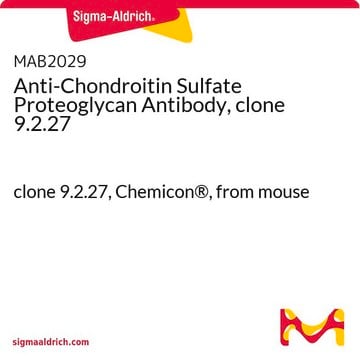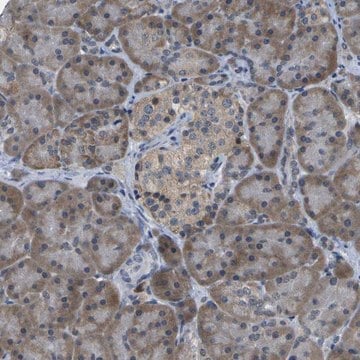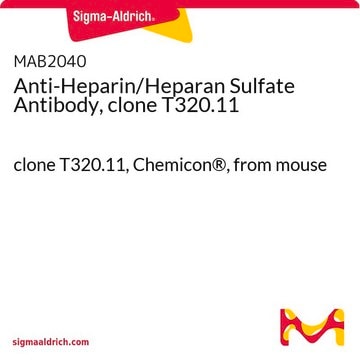C8035
Monoclonal Anti-Chondroitin Sulfate antibody produced in mouse
clone CS-56, ascites fluid
Synonyme(s) :
Chondroitin Sulfate Antibody, Chondroitin Sulfate Antibody - Monoclonal Anti-Chondroitin Sulfate antibody produced in mouse, Cs56 Antibody
About This Item
Produits recommandés
Source biologique
mouse
Niveau de qualité
Conjugué
unconjugated
Forme d'anticorps
ascites fluid
Type de produit anticorps
primary antibodies
Clone
CS-56, monoclonal
Espèces réactives
chicken, bovine, mouse, human, pig, rabbit, rat
Technique(s)
indirect immunofluorescence: 1:200 using bovine mammary gland epithelial (BMGE) cells
microarray: suitable
Isotype
IgM
Numéro d'accès UniProt
Conditions d'expédition
dry ice
Température de stockage
−20°C
Modification post-traductionnelle de la cible
unmodified
Informations sur le gène
human ... ACAN(176)
mouse ... Acan(11595)
rat ... Acan(58968)
Description générale
This product can be found as purified product that was produced using cell culture hybridoma (SAB4200696)
Spécificité
Immunogène
Application
- in immunohistochemistry as primary antibody to study of spinal cords and brain cryosections.
- in ELISA and western blot for purification of soluble forms of myelin-associated glycoprotein (MAG) and neural cell adhesion molecule (N-CAM).
- in flow cytometry studies.
- as primary antisera in a study of TGF-β regulation.
Actions biochimiques/physiologiques
Stockage et stabilité
For extended storage, the solution may be frozen in working aliquots. Repeated freezing and thawing is not recommended. Storage in "frost-free" freezers is not recommended. If slight turbidity occurs upon prolonged storage, clarify the solution by centrifugation before use.
Autres remarques
SAB4200696 Anti-Chondroitin Sulfate antibody, Mouse monoclonal
clone CS-56, purified from hybridoma cell culture
Clause de non-responsabilité
Not finding the right product?
Try our Outil de sélection de produits.
Produit(s) apparenté(s)
Code de la classe de stockage
12 - Non Combustible Liquids
Classe de danger pour l'eau (WGK)
WGK 1
Point d'éclair (°F)
Not applicable
Point d'éclair (°C)
Not applicable
Certificats d'analyse (COA)
Recherchez un Certificats d'analyse (COA) en saisissant le numéro de lot du produit. Les numéros de lot figurent sur l'étiquette du produit après les mots "Lot" ou "Batch".
Déjà en possession de ce produit ?
Retrouvez la documentation relative aux produits que vous avez récemment achetés dans la Bibliothèque de documents.
Les clients ont également consulté
Articles
Glycosaminoglycans are large linear polysaccharides constructed of repeating disaccharide units.
Notre équipe de scientifiques dispose d'une expérience dans tous les secteurs de la recherche, notamment en sciences de la vie, science des matériaux, synthèse chimique, chromatographie, analyse et dans de nombreux autres domaines..
Contacter notre Service technique















